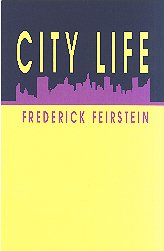
Rhyme, Part 2 of 3
by Frederick Feirstein
Copyright (c) 1996 by Frederick Feirstein
Reprinted by Special Permission of Frederick Feirstein, 1996
and Story Line Press, 1996
Not to be distributed in whole or in part for commercial purposes.
Guest Essayist: Fred Feirstein

Copyright (c) 1996 by Frederick Feirstein
Reprinted by Special Permission of Frederick Feirstein, 1996
and Story Line Press, 1996
Not to be distributed in whole or in part for commercial purposes.
In "The Psychiatrist At The Cocktail Party" (City Life, Story Line Press, l99l) rhyme not only develops character but also dramatic structure. "The Psychiatrist At The Cocktail Party" is a companion-piece, theatrically speaking, to Manhattan Carnival. The poem is a dramatic sequence of seventeen rhymed monologues, interlocking to form a plot and subplot. The plot is a political satire about a Manhattan fund-raiser for Latin American guerillas which turns into a coup of their leader. The subplot is a bedroom farce. (Both Manhattan Carnival and "The Psychiatrist" have been performed in the theater.)
All the monologues are spoken to a psychiatrist named Ben who has only two monologues, one near the beginning, and one (in couplets for lyric intensity) forming the epilogue. There are many different rhyme schemes that help develop the various characters and themes. For instance, Mark Stern re-appears at the cocktail party seven years after Manhattan Carnival. He has learned some of the consequences of having a child in the city, and the change in rhyme reflects that. "... I work two jobs. My wife/ Works one. I know I'm shortening my life/ To pay a nanny and a girl to dust./ Crazy. Crazy. Crazy. Crazy. Why do we stay?" Though there are still some couplets, echoing his old life, the rhyme scheme of his monologue is irregular and the rhymes are now far apart.
Two of the works I've learned from in writing dramatic poetry are Shakespeare's Henry IV, Part I, and Chaucer's Canterbury Tales. Shakespeare partly structured that play and developed his characters with parallels and contrasts, often of imagery. Chaucer structured Canterbury Tales partly by arranging his characters into groups according to their position in society and the themes he was developing. I've specifically used rhyme in "The Psychiatrist" to group characters for dramatic effect and for elaboration of theme. For instance, sestets stylistically connect one group of characters around the theme of hypocrisy. The first target is Larry who has inherited a coffee plantation near the rebel base. It is he who is throwing the fundraiser for the guerillas. Larry opens the poem by speaking in sestets rhyming abcacb, the delay of the "b" rhyme helping to establish Larry's quirkiness, his erratic shifting of tone.
Look who's standing in my bedroom door! Give me your coat, Ben. Glad you could come To one of my fund-raising bashes. This one is for that man from Quistador. Startling, these guys in khaki and mustaches. Try an hors d'oeuvres. The catering is yum Where's Mary? ... Jeez, does she have a fever? I hope it's just the flu and nothing more. Even you'd be a hypochondriac With my mother -- it was so hard to leave her. I wish Mary wasn't flat on her back; I wanted her to see my new decor. It's Pop-Colonial, a parody: Brighton bamboo, but painted Third World red. The knicknacks are from 42nd Street, Las Vegas, and Disneyland: our ivory But crafted out of plastic -- Go on, eat -- And not one single elephant shot dead.
A different kind of sestet, rhyming abccba, enveloping the satirical couplet is spoken by Larry's Mother. She is bawdy and intuitive, traits which appear, for instance, in her rhyming "insurrection" with "erection." In coming to see the connection between Larry's problems with his instincts and his ideals, Larry's Mother exposes the hypocrisy of Larry's political agenda:
Tell me if this is self-destructive: Quistador Borders the country where we import Our coffee beans. Larry says To me, only to me, Juarez Will leave our crops alone if we support His cause, if we serve schnapps to the senor. But now, of course, I overhear my Larry Talk only of ideals to everyone ...
By the end of her monologue, she discovers for the reader the origins of Larry's politicking:
... You know how he used to defend Himself in school? He'd befriend the scum, Or give them money so they wouldn't beat him up. Like now -- I never thought of it! You see what happens even talking to a shrink? Your golden silence made me think! He's buying protection, the little shit. Let me pour our coffee in your cup.
Renee's Dance Partner, whose sexual intrigues satirically parallel Larry's political manipulations, speaks in irregular sesets which sometimes also include the satirical couplet. The sesets are run together without stanza breaks which helps camouflage the stanzaic pattern, stylistically matching the veiling of the Dance Partner's intentions:
Look at that Spanish guy in camouflage, Those Calvin Klein fatigues and combat boots, That beard trimmed in a mirror in the woods Where Larry sends him whiskey and canned goods, Like Larry's father stocked an Elks Club lodge With little franks and long cheroots. Why these phallic images, Doc? Why am I fighting down an urge to tweak A chin hair from that strutting, radically chic Cartoon? Let's do, "She loves me, loves me not"
By the end of his monologue, Renee's Dance Partner reveals to the psychiatrist and to the reader the Dance Partner's veiled intentions that his sestets have been preparing for:
...Renee, the pom pom Queen, whose every honey Was someone with a hoard of family money, Like him the Meat King with his chopped meat putz. Not sentimental Larry she called "lazy." We'll dance again. But this time when we kiss, Slipping a pill from mouth to mouth, I think I'll tell her -- leading her by the waist outside -- That the way to zap her husband for the shrink- Sending he wants to do is to piss Him off right now by taking Larry for a ride In Meato's big back-seated Rolls (Un!) Royce While I, in the commotion, comfort Joyce.
While Renee's Dance Partner parallels Larry; the Dance Partner and Larry are also, ironically, contrasted to The Guest Of Honor, the guerilla leader Juarez who turns out to be genuinely tragic. Juarez speaks in simpler, more straight-forward sestets rhyming abcabc, a scheme which subdues the echoing effect of the rhymes, necessary for the far more serious consequences of political opportunism.
Until he speaks, Juarez has been caricatured at a distance by other guests as being a self-serving bully. Instead he turns out to be poignantly self-aware and insightful about the limitations of a politics he no longer finds morally supportable. Juarez ends his monologue this way:
... But hear The actor wants to take his makeup off! I hate the ignorance of peasants. Food, more food, This revolution to deny their fear That God The Father's dead. Please don't scoff At my simplistic use of you. I brood About my motives while I strategize. I want to be free. They want to be red. Illiterates and autodidacts, they Quote me Marx, Lenin, while Communism dies All over Europe! They want to get ahead, These bureaucrats-to-be, the proven way. How can I live with my own fabrication? How can I live freely, not revolted, Not a tyrant to myself, not led Into self-assassination? Wouldn't Larry, that idealist, be jolted If he could see the drama in my head, The sacrificial rite that makes t.v.? Since Our Father died, we need blood, more blood -- The Kennedys, Martin Luther King. The final makeup they will do on me Will simply be my face shoved down in mud, My brothers and my sisters pummeling.
Fred Feirstein
Next time, Feirstein continues with a look at his method and reasons for rhyme in Ending the 20th Century.

City Life (Story Line Press, 1991)
(Amazon) (including the The Psychiatrist at the Cocktail Party)
Story Line Press
1991